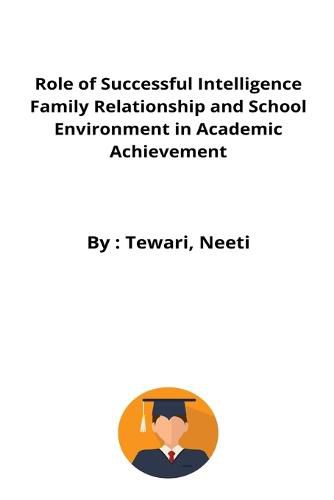Readings Newsletter
Become a Readings Member to make your shopping experience even easier.
Sign in or sign up for free!
You’re not far away from qualifying for FREE standard shipping within Australia
You’ve qualified for FREE standard shipping within Australia
The cart is loading…






This title is printed to order. This book may have been self-published. If so, we cannot guarantee the quality of the content. In the main most books will have gone through the editing process however some may not. We therefore suggest that you be aware of this before ordering this book. If in doubt check either the author or publisher’s details as we are unable to accept any returns unless they are faulty. Please contact us if you have any questions.
INTRODUCTION AND REVIEW OF LITERATURE Education is an important component which produces great returns on human resources. Major concern of education is to ensure that each child is able to make most of his abilities. It is the most effective means to the way to success as it enables the child to develop his abilities to the maximum. In this world of competition, the educational status of an individual is highly depicted through one’s academic achievement. If education is an investment then academic achievement is the return. In the present socio-economic context, great importance is placed on achievement in formal education. A person’s level of education and his academic achievements have become an indicators of his status in the society. The scores in examination decide and reflect the level of intelligence whereas education is related to the life chances, income, well-being and success (Battle & Lewis, 2002). In our society, academic achievement has become a key criterion for judging a person’s potentiality and capability. Right from the beginning stress is laid upon the score of a student by one’s parents, teachers and society. A child develops achievement motivation from his life setting. Academic achievement has raised many important questions for researchers in the field of educational psychology. As educators, we need to understand what research in education and psychology is discovering about the influence various factors have on student achievement. The problem why students achieve or fail to achieve in school has always interested psychologists and educators. Academic performance enables a student the access to enter institutions of higher education, it shapes their career paths and life course, that is why, much psychological research has focused on identifying predictors of academic performance. Academic achievement is generally taken as scores or grades obtained by a student. It is related to level of proficiency attained in scholastic or academic work. Percentages of score or grades are most common means to interpret a student’s level of academic achievement. Term Academics has been derived from the word ‘Academy’ which means a school, thus academic achievement explains the academic achievements of a student in a school or educational institutions,
$9.00 standard shipping within Australia
FREE standard shipping within Australia for orders over $100.00
Express & International shipping calculated at checkout
This title is printed to order. This book may have been self-published. If so, we cannot guarantee the quality of the content. In the main most books will have gone through the editing process however some may not. We therefore suggest that you be aware of this before ordering this book. If in doubt check either the author or publisher’s details as we are unable to accept any returns unless they are faulty. Please contact us if you have any questions.
INTRODUCTION AND REVIEW OF LITERATURE Education is an important component which produces great returns on human resources. Major concern of education is to ensure that each child is able to make most of his abilities. It is the most effective means to the way to success as it enables the child to develop his abilities to the maximum. In this world of competition, the educational status of an individual is highly depicted through one’s academic achievement. If education is an investment then academic achievement is the return. In the present socio-economic context, great importance is placed on achievement in formal education. A person’s level of education and his academic achievements have become an indicators of his status in the society. The scores in examination decide and reflect the level of intelligence whereas education is related to the life chances, income, well-being and success (Battle & Lewis, 2002). In our society, academic achievement has become a key criterion for judging a person’s potentiality and capability. Right from the beginning stress is laid upon the score of a student by one’s parents, teachers and society. A child develops achievement motivation from his life setting. Academic achievement has raised many important questions for researchers in the field of educational psychology. As educators, we need to understand what research in education and psychology is discovering about the influence various factors have on student achievement. The problem why students achieve or fail to achieve in school has always interested psychologists and educators. Academic performance enables a student the access to enter institutions of higher education, it shapes their career paths and life course, that is why, much psychological research has focused on identifying predictors of academic performance. Academic achievement is generally taken as scores or grades obtained by a student. It is related to level of proficiency attained in scholastic or academic work. Percentages of score or grades are most common means to interpret a student’s level of academic achievement. Term Academics has been derived from the word ‘Academy’ which means a school, thus academic achievement explains the academic achievements of a student in a school or educational institutions,